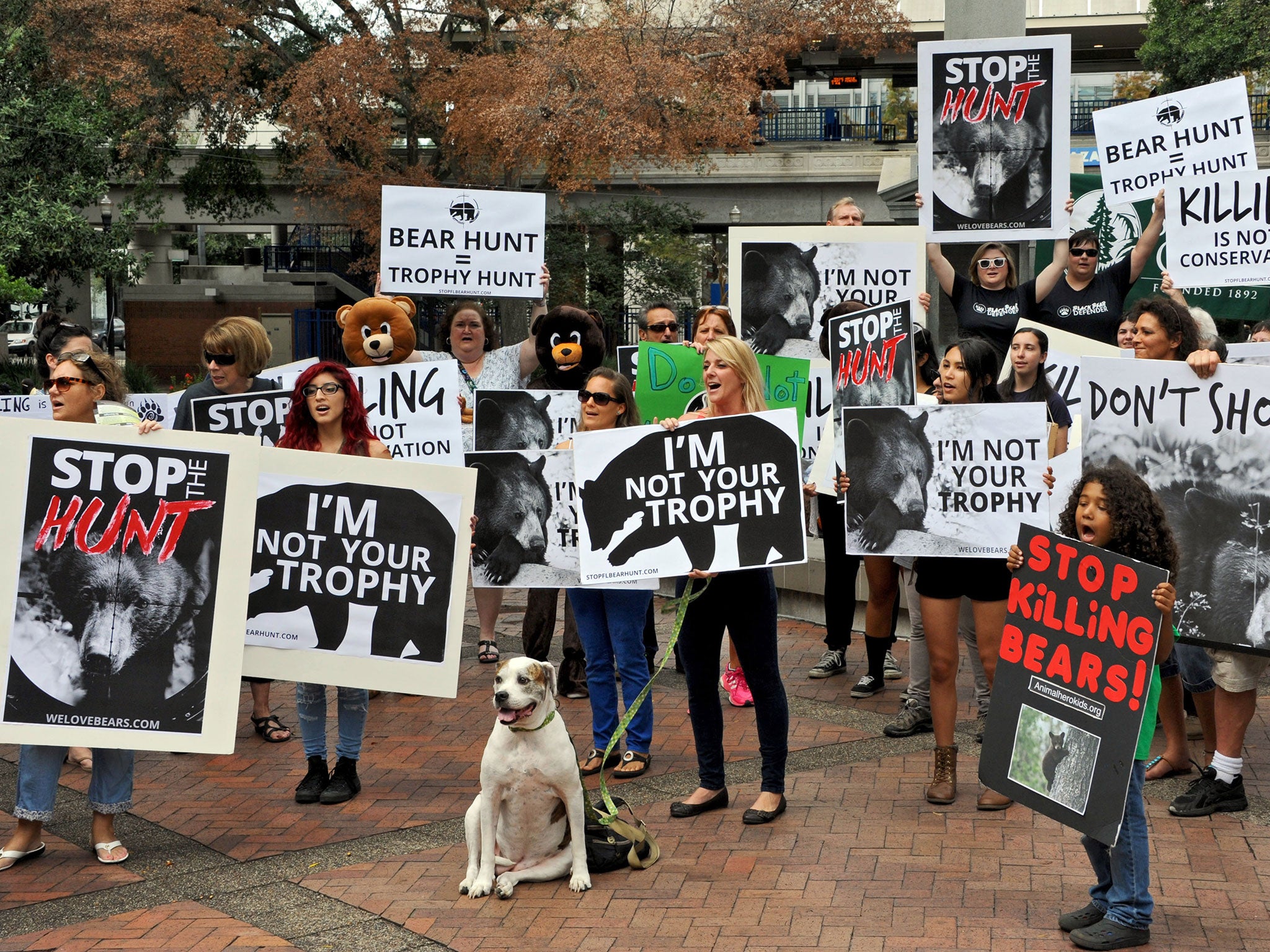Florida bear hunt: Authorities accused of facilitating 'trophy hunts' as hundreds of bears killed
As the Florida suburbs sprawl ever further into their traditional habitats, bears and other large predators have come into more frequent contact with humans

Your support helps us to tell the story
From reproductive rights to climate change to Big Tech, The Independent is on the ground when the story is developing. Whether it's investigating the financials of Elon Musk's pro-Trump PAC or producing our latest documentary, 'The A Word', which shines a light on the American women fighting for reproductive rights, we know how important it is to parse out the facts from the messaging.
At such a critical moment in US history, we need reporters on the ground. Your donation allows us to keep sending journalists to speak to both sides of the story.
The Independent is trusted by Americans across the entire political spectrum. And unlike many other quality news outlets, we choose not to lock Americans out of our reporting and analysis with paywalls. We believe quality journalism should be available to everyone, paid for by those who can afford it.
Your support makes all the difference.For Paul Fitzgerald, a high school student and hunting enthusiast, the past weekend’s shooting spree was the fulfilment of a dream. “I was born into it, so it just came natural,” the 16-year-old said after shooting dead an 80kg black bear.
Amid an outcry, and with the aim of curbing a booming black bear population, the Florida Fish and Wildlife Conservation Commission (FWC) issued almost 4,000 permits – more than the number of black bears in the state – for Florida’s first bear hunt in 21 years.
More than 200 bears were killed on the hunt’s first day on 24 October, and by late the next day it was estimated that hunters would have killed 320 bears, over the objections of animal rights activists, who said the FWC was simply facilitating “trophy hunts”.
Paul Palmer, 71, said he waited in a tree stand. When a bear appeared he fired and struck the animal behind the shoulder. It turned and ran, but could not go far. Mr Palmer climbed down and shot the 140kg bear once more. “They [protesters] can’t rule what everybody else wants,” he told The Orlando Sentinel. “The protesters, in my opinion, are the vast minority of people. They’re not hunters. They live in the city. They probably wouldn’t even want to go out in the woods, you know?”
Among the first bears killed was a lactating female. “Now there are one or two babies alone so she [the hunter] can have a trophy on her wall,” said Astevia Willett, 53, who was monitoring the hunt. The FWC said the hunt was timed so the youngest bear cubs would be eight or nine months old and could survive on their own – probably.
The state’s largest native land mammal, Florida’s black bear was considered endangered and protected by the state until 2012, but the population has grown from a few hundred in the 1970s to some 3,500 today. No hunting of the bears had been allowed since 1994.
“There has been a need to make [hunting] seasons longer, make them more liberal, because there have been so many predators and they’re not as controlled as they should be,” said Nick Pinizzotto, president of the Sportsmen’s Alliance, a hunters’ organisation.
As the Florida suburbs sprawl ever further into their traditional habitats, bears and other large predators have come into more frequent contact with humans.
At least four people have been injured in bear attacks in Florida over the past two years. On 23 October a man was slashed on the arm by a 180kg bear as it emerged from scavenging in rubbish bins at a hotel in the coastal town of Eastpoint.
The FWC said the hunt was not related to the bear-on-human attacks, yet animal rights campaigners say the state should be focused not on killing bears, but on better management of the waste that draws them to populated areas. Kate MacFall, Florida director for the Humane Society of the United States, said the hunt was “completely unnecessary”, adding: “Research overwhelmingly shows that hunting bears in the woods doesn’t reduce problems with bears in neighbourhoods. The state would be better off helping citizens manage trash and outdoor food sources.”
An 11th-hour legal bid to halt the bear hunt was blocked by an appeals court late on 23 October. The hunt was due to end as soon as the state recorded a 320th kill. Hunters were told they could not use bait to attract bears, and could not use dogs to track the bears and chase them into the trees to be shot – a practice permitted in some other states.
New Jersey lengthened its bear hunting season this year, following a fatal attack on a hiker last year. Meanwhile, New Mexico, Oregon and Utah are all considering new legislation to permit further hunting of mountain lions, also known as cougars.
Join our commenting forum
Join thought-provoking conversations, follow other Independent readers and see their replies
Comments